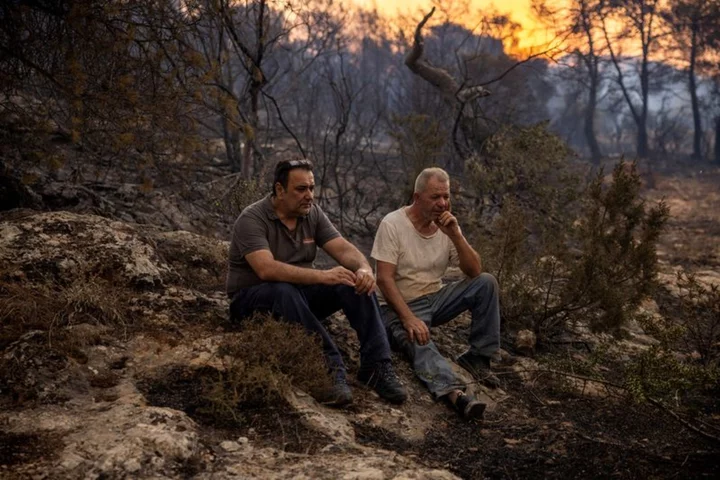By Ryan Woo and Hyonhee Shin
BEIJING/SEOUL Tourists flocked to a giant thermometer in China showing surface temperatures of 80C (176 Fahrenheit) while the death toll from torrential rains in South Korea hit 44 on Wednesday, the latest extreme weather sparking havoc and curiosity around the world.
Wildfires burned for a third day west of the Greek capital Athens, with air water bombers resuming operations at first light and firefighters working throughout the night to keep flames away from a complex of coastal refineries.
In a stifling Beijing, U.S. climate envoy John Kerry began the third day of talks with Chinese officials, expressing hope that cooperation to combat global warming could redefine troubled ties between the two superpowers.
A global pattern of heat waves that have scorched parts of Europe, Asia and the United States this week have thrown that challenge into sharp relief. The World Meteorological Organization warned on Tuesday of increased risk of deaths linked to excessively high temperatures.
Meanwhile Hawaii's Big Island was bracing for the impact of Tropical Storm Calvin, expected to bring as much as 8 inches (20.3 cm) of rain and strong wind gusts, the National Weather Service (NWS) said.
In South Korea, deluges of rain have pummelled central and southern regions since last week. Fourteen deaths occurred in an underpass in the central city of Cheongju, where more than a dozen vehicles were swamped on Saturday when a river levee collapsed. In the southeastern province of North Gyeongsang, 22 people died, many from landslides and swirling torrents.
This year’s casualties have rekindled questions over South Korea’s efforts to prevent and respond to flood damage, less than one year after the heaviest downpours in 115 years pounded Seoul.
President Yoon Suk Yeol has said the situation was made worse because of lax management of vulnerable areas and failures to follow rules, and designated 13 flood-hit areas as special disaster zones on Wednesday.
Prime Minister Han Duck-soo called for faster repair efforts to head off additional damage, warning of more heavy rainfalls predicted in the weekend.
“Taking extreme weather events caused by climate change as part of our daily lives, we will create institutional measures and systems accordingly,” Han told an intra-agency meeting on flood responses.
CURIOUS TOURISTS
In China's western Xinjiang province, tourists armed with broad-brimmed hats and umbrellas braved scorching temperatures to take selfies by a giant thermometer that displayed a real-time surface temperature of 80C (176 Fahrenheit), state television showed.
Each summer, curious tourists flock to the Flaming Mountains on the northern rim of Xinjiang's Turpan Depression to admire not just their corrugated slopes of brown-red sandstone but also to take in the super-charged heat emanating from the ground.
In recent days, temperatures in Xinjiang and other parts of Asia, as well as Europe and the United States have shattered records.
On Sunday, a remote township in the Turpan Depression registered a maximum air temperature of 52.2C, smashing China's national record of 50.3C set in 2015, also in the basin.
On that day, the oasis city of Turpan west of the Flaming Mountains saw the highest air temperatures at 31 local weather stations exceed 45C, with the maximum at five of them breaking above 50C, according to state media on Wednesday.
On Tuesday, Beijing logged its 27th day of temperatures of more than 35C, setting a new local record for the most number of high-temperature days in a year. The Chinese capital's previous record was 26 days, set in 2000.
These unprecedented temperatures have added new urgency for nations around the globe to tackle climate change that scientists say will make heat waves more frequent, severe and lethal.
In contrast to the extreme heat, heavy rains, thunderstorms, gales and hail are expected to lash other parts of China over the next 18 hours, according to the country's National Meteorological Centre.
With the world's two biggest economies at odds over issues ranging from trade to Taiwan, Kerry told Chinese Vice-President Han Zheng on Wednesday that climate change must be handled separately to broader diplomatic problems.
"It is a universal threat to everybody on the planet and requires the largest nations in the world, the largest economies in the world, the largest emitters in the world, to come together in order to do work not just for ourselves, but for all mankind," Kerry told Han.
Kerry has also held meetings with China's top diplomat Wang Yi and Premier Li Qiang as well as veteran climate envoy Xie Zhenhua in a bid to rebuild trust between the two sides ahead of COP28 climate talks in Dubai at the end of the year.
(Reporting by Ryan Woo and Valerie Vocovici in Beijing and Hyonhee Shin in Seoul; Writing by John Geddie; Editing by Stephen Coates)

